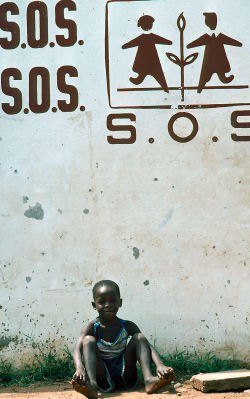Burundi; war, poverty and misfortune
The Republic of Burundi in Central Africa is one of the continent's smallest countries and one of the world's poorest. Eight years of civil war, in which over 200,000 people lost their lives, have destroyed much of the infrastructure. Food, medicine and electricity are still in short supply. A lack of basic social services and limited economic opportunities mean most of the people are subject to continuing disease, trauma and displacement.
Aids Orphans in Burundi

In Burundi, the incidence of HIV/AIDS continues to rise ,especially in rural areas. An estimated 20 per cent of the country’s urban population and six per cent of the rural population are HIV positive. Infection rates in girls aged 15 to 19 are four times greater than boys of the same age. There are an estimated 230,000 children orphaned by HIV/AIDS in the country, 30% of all orphans. (Source UNICEF).
SOS Children works with NGOs in Burundi to support the work to prevent and treat HIV/AIDS and related diseases. This is done through so-called "Anti-AIDS Clubs" in Bujumbura, Gitega, Muyinga and Rutana. Reaching out to families in the local communities, SOS Children provides voluntary testing, education materials for schools and anti-retrovirals.
Bujumbura: The partnership with the Government, World Food Programme (WFP) and the National Council for Fight against AIDS (NCFA) is well developed. The SOS Children's Village,Bujumbura receives food from WFP. NCFA helps HIV/AIDS Orphans and other vulnerable children with anti-retroviral drugs. The partnership with the Government involves the three relevant ministries - Ministry of Social Action and Woman Promotion, Ministry of Public Health and the Ministry of National Education. Co-operation with UNICEF is a continuing priority.
Working with a doctor from Muyinga and a nurse from Uvira, patients are given anti-retrovirals (ARVs) and their progress monitored. ARVs are provided by the Burundi Initiative Strengthening for the Prevention and the Taking Care of Persons living with HIV/AIDS.
In one group of voluntary testing for HIV/AIDS, 76.5% were negative, 20.3% were positive and 3.1% were doubtful. As part of the programme to prevent the spread of HIV/AIDS and other sexually transmitted diseases, condoms were distributed.
Muyinga: As part of our programme of strengthening the family, we have increased substantially the number of children we are helping within their biological or foster families. Heads of families who are affected by HIV/AIDS continue to receive medical care including anti-retrovirals. The results are very encouraging.
Gitega: Within the Family Strengthening Programme, SOS Children has organised the training of volunteers within the local community to follow-up the beneficiaries in their households. This training dealt with generalities on HIV/AIDS, its transmission and its prevention as well as caring of people living with HIV/AIDS. It was organised by two specialists, members of the provincial committee of fight against AIDS in Gitega province. SOS CHildren has also set up income generating activities. Our aim is to strengthen the families of orphans and vulnerable children.